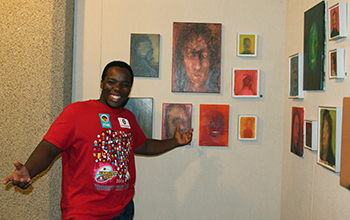
Art student, Thamsanqa Malgas views the Purgatorium exhibition at the Stegmann Gallery on the Bloemfontein Campus (UFS).
Photo: Rethabile Isaacs
|
Purgatory is a temporary condition of torment or suffering. This is the central thread of the renowned artist’s exhibition, Purgatorium, at the University of the Free State (UFS). Pauline Gutter’s exhibition was opened by Harry Siertsema on 9 March 2016 at the Stegmann Gallery on the Bloemfontein Campus.
The artist, who grew up on a farm in the Free State, is influenced by animals and farm life. “My work is on many levels a metaphorical representation of the violence of current South Africa. Some people want to move away from stigma, others adopt hysteria. The impressive yet vulnerable bulk of the bulls depicted in uncomfortable positions manifests the voiceless and powerless generation of food producers in their daily struggles for survival,” she wrote in the catalogue of the exhibition.
Prof Dirk van den Berg of the UFS Department of History of Art and Image Studies wrote an essay about the exhibition, in which he captures the lived endurance of stress and suffering which Pauline Gutter depicts vividly in Purgatorium.
“The paintings, drawings, and prints in this exhibition have, in various ways, the effect of disseminating the basic tenor of the weaning metaphor of struggle for survival into the farming domains of the land, its creatures, and its people,” said Prof van den Berg.
Art student, Thamsanqa Malgas, was very impressed with the exhibition, saying that it was a fascinating collection, and a must-see for art lovers. The exhibition closed on 1 April 2016.